Kizin orijinal la & Bathroom King Kitchen & Bathroom Headlines
For a long time, there are numerous counterfeits and cottages in the sanitary industry. This has caused many enterprises to suffer from economic and brand reputation losses. In the face of repeated infringement and counterfeiting, some head sanitary ware enterprises “strike hard”. They defend their rights and interests through law, and promote the standardized development of the industry. According to incomplete statistics, soti nan 2021 to the present, only Hegii, Jomoo, Arrow three sanitary ware enterprises initiated on trademark infringement, and patent infringement of intellectual property litigation cases exceeded 215 cases, and the maximum amount of compensation reached 300,000 Yuan.
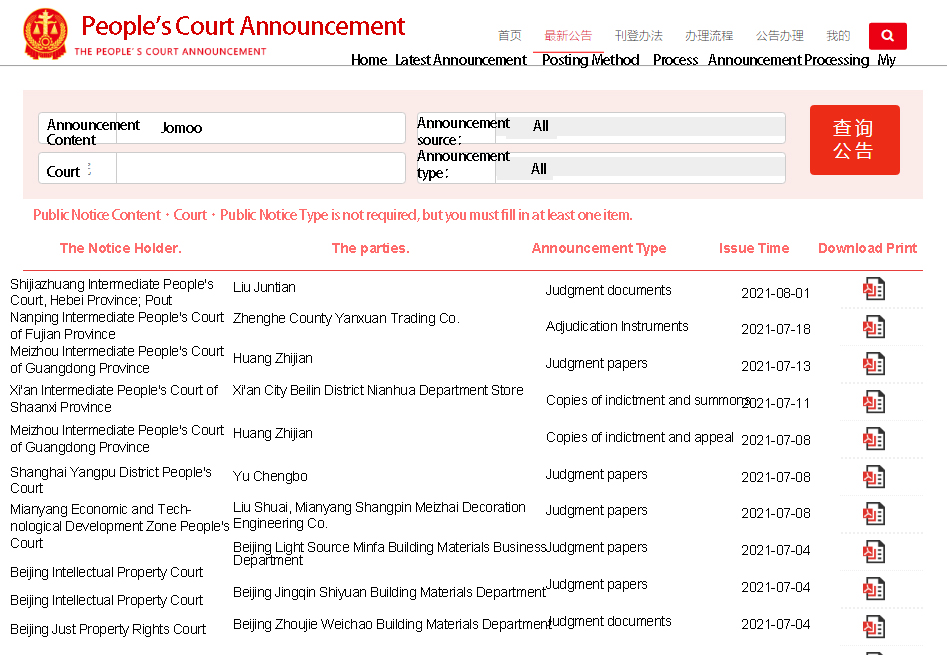
Ane sa a, the bathroom three giants have so far launched
More than 215 intellectual property litigation
Through enterprise search, the people’s court announcement network counted out: Nan 2021 so far, Hegii, Jomoo, Flèch 3 bathroom companies launched on trademark infringement, patent infringement of intellectual property litigation cases more than 215. These involve infringement of trademark rights, design patent rights and utility model patent rights disputes.
According to incomplete statistics, in these 215 cases, the plaintiff withdrew 127 cases, accounting for 59.07% of the cases. These are mainly due to the settlement between the parties, the plaintiff to the court to apply for withdrawal. Most of the litigation cases were focused on disputes over infringement of trademark rights, avèk 181 cases (84.17%).
Hegii filed more than 9 lawsuits for trademark infringement, and Arrow Home had 69 lawsuits for trademark infringement. 7 cases were related to trademark ownership and infringement disputes. Pami yo, 12 lawsuits were supported by the court, and the cumulative amount of compensation was a total of 753,000 Yuan.
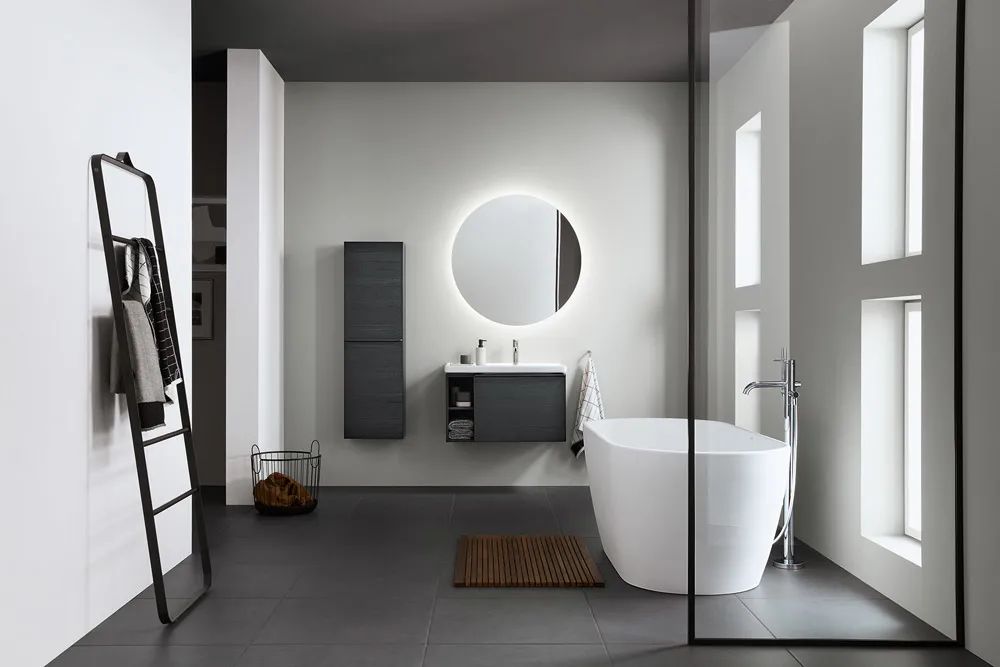
Among the three sanitary ware companies, Jomoo has the most litigation cases about trademark infringement and patent infringement. There are 130 lawsuits. Pami yo, 104 cases involved disputes on infringement of trademark rights, 5 cases involved disputes on trademark rights ownership and infringement, epi 21 cases involved disputes on infringement of design patents and utility model patents, and the cumulative amount of compensation awarded reached 838,000 Yuan.
Pou egzanp, in the case of Jomoo v. Sheng Mouqing, which was publicly heard in April 2021, the defendant Sheng Mouqing used an online store name with the word “Jomoo King” and also used “Jomoo King” in the product introduction, packaging and instructions when selling sanitary products. ” epi “JIJON”. It also marked “JIJON” on its products. This is similar to Jomoo’s registered trademark “JOMO”, which is likely to cause confusion, so the court found that Sheng Mouqing constituted an infringement, and ordered it to stop the infringement and compensate Jomoo for economic losses of 100,000 Yuan.
In addition to Hegii, Arrow and Jomoo, other brands in the ceramic and sanitary industry are also stepping up efforts to combat infringement of intellectual property rights. Dènyèman, Marco Polo Technology Co., Ltd. and Qingdao Fashion Marco Polo Kitchen & Bath Co. They were ordered to compensate the plaintiff Guangdong Weimei Ceramics Co. This is the highest award in the Marco Polo trademark right defense case. Jiska kounye a, Marco Polo tile trademark infringement cases, civil cases have been awarded over 50 milyon yuan. In criminal cases, 23 people have been sentenced for infringement of intellectual property rights.
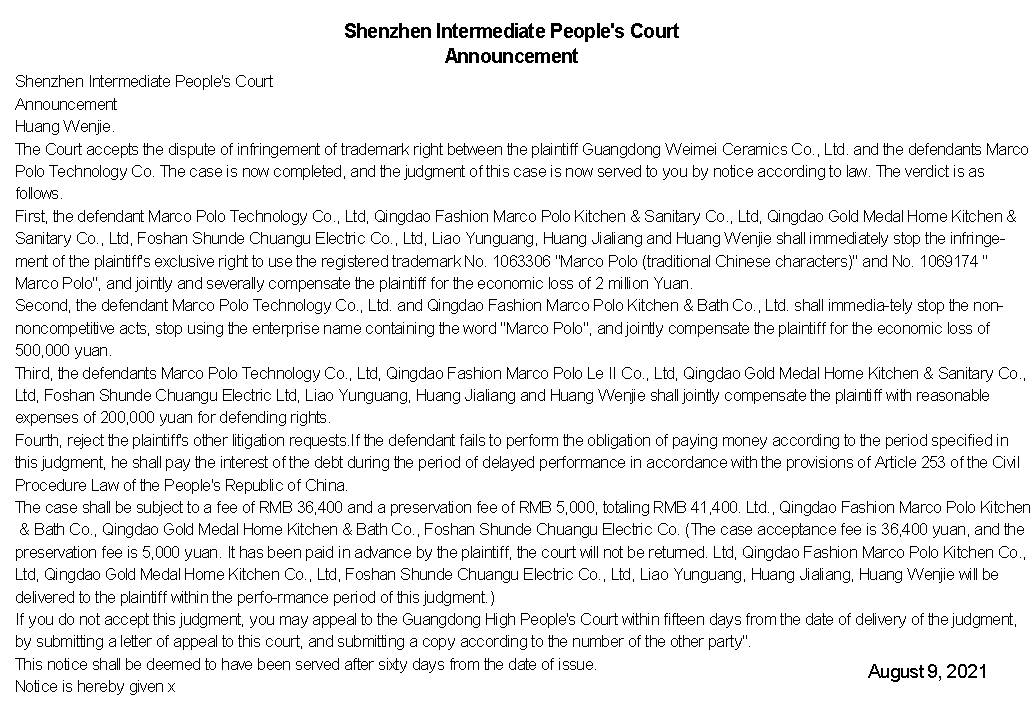
It is not easy to defend the right, and the cost is high
The amount of compensation is mostly 10-50,000 Yuan
In these 215 lawsuits, most of the infringements are small workshops, stores or individual operators. Even if these merchants are punished financially, the penalty is not strong enough, and they can change their “vest” and operate again after a while. For the infringed enterprises, the amount of compensation is not large, but have to invest a lot of money, energy and time to defend the rights. This makes them feel that it is not easy to defend their rights.
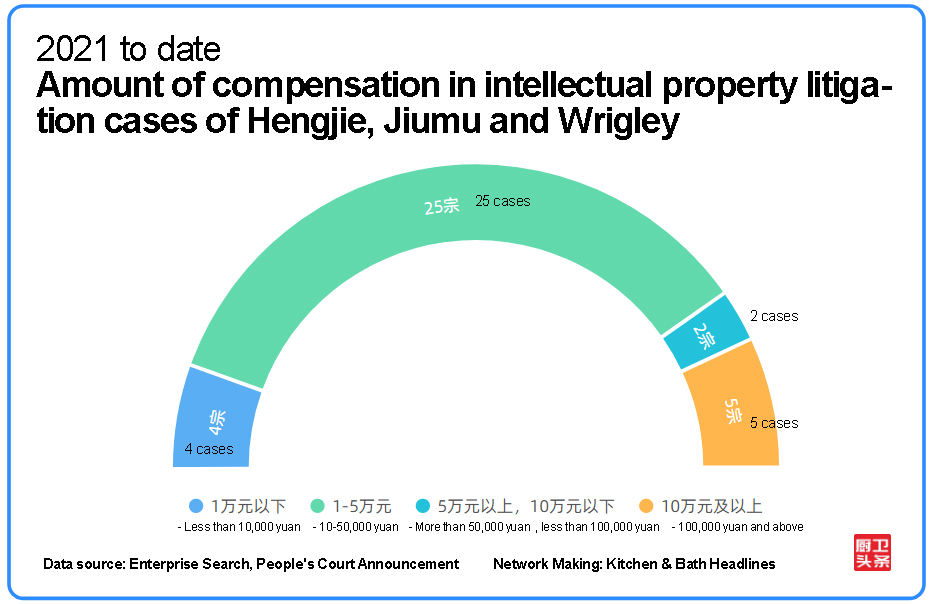
Pou egzanp, most of Arrow Home’s litigation cases have a litigation target of 100,000 RMB. Sepandan, because it was difficult to provide the court with sufficient evidence of the specific losses suffered due to infringement, the profits gained by the defendant and the license fee of the registered trademark. The court took various aspects into consideration and finally awarded the defendants damages mostly in the range of 10,000-50,000 RMB, and in some cases even below 10,000 RMB.
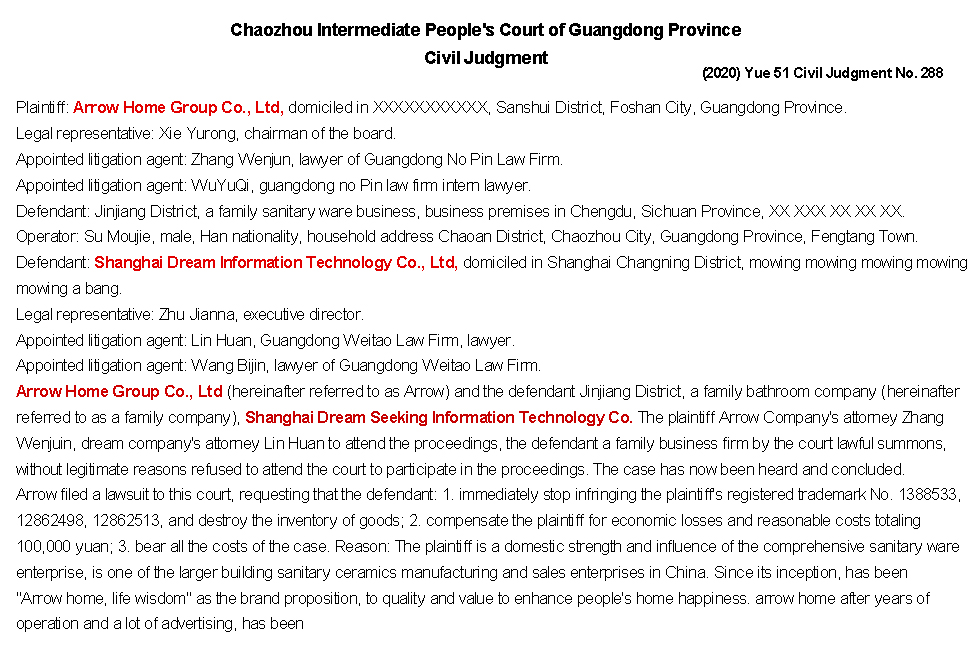
Kounye a, Pinduoduo and Taobao online stores have become the “hardest hit” areas for selling counterfeit products. Many counterfeit and cottage bathroom products are scattered in these platforms for sale. Among 215 lawsuits, Hegii, Jomoo, Arrow up X Dream Technology Ltd. and the persons involved filed a total of 19 cases. Pinduoduo is a third-party mobile e-commerce platform under the merchant-in-residence model belonging to Shanghai X Dream Information Technology Co.
The continuous emergence of counterfeit and cottage products has affected many sanitary ware companies. This makes them on the “quality inspection blacklist”, and also makes consumers have the psychology of “fake products, dare not buy” to the brand. These have caused double losses of enterprise economy and brand reputation.
Actively cracking down on counterfeiting all over the country
The prosecution rate of IPR infringement crimes in the first half of the year reached 91.8%.
Prosecution rate reached 91.8%
At the end of last year, Guangdong Anti-counterfeiting Association joined hands with GROHE and other 200 enterprises to make a declaration of “Anti-counterfeiting Co-Building Unit” epi “Quality Co-Building and Co-Governance Sharing Enterprise” initiative. They will work together to maintain fair competition in the market and create a good business environment. At the beginning of this year, various methods were adopted across the country to actively combat various counterfeiting and other illegal acts.
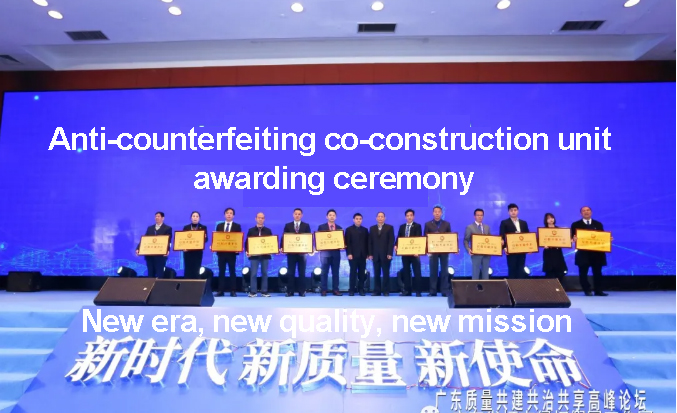
Nan mwa Jiyè 25, the Supreme People’s Procuratorate released data on IPR prosecution: In terms of criminal prosecution, the national procuratorial authorities prosecuted a total of 6,017 people for IPR infringement crimes in the first half of the year, yon ogmantasyon de 12.6% ane sou ane. The prosecution rate reached 91.8%, which is 6.2 percentage points higher than the overall criminal offenses, and this is the highest point in the past five years. The crimes were mainly focused on the crimes of counterfeiting registered trademarks and selling counterfeit registered goods. The Guangdong region had the highest number of people prosecuted for IPR infringement crimes, avèk 1,463 moun. In terms of civil prosecution, cases involving intellectual property rights also rose significantly. In the first half of the year, the national procuratorial authorities received a total of 100 cases of supervision of civil judgments and mediations involving intellectual property and competition disputes, yon ogmantasyon de 88.7% ane sou ane.
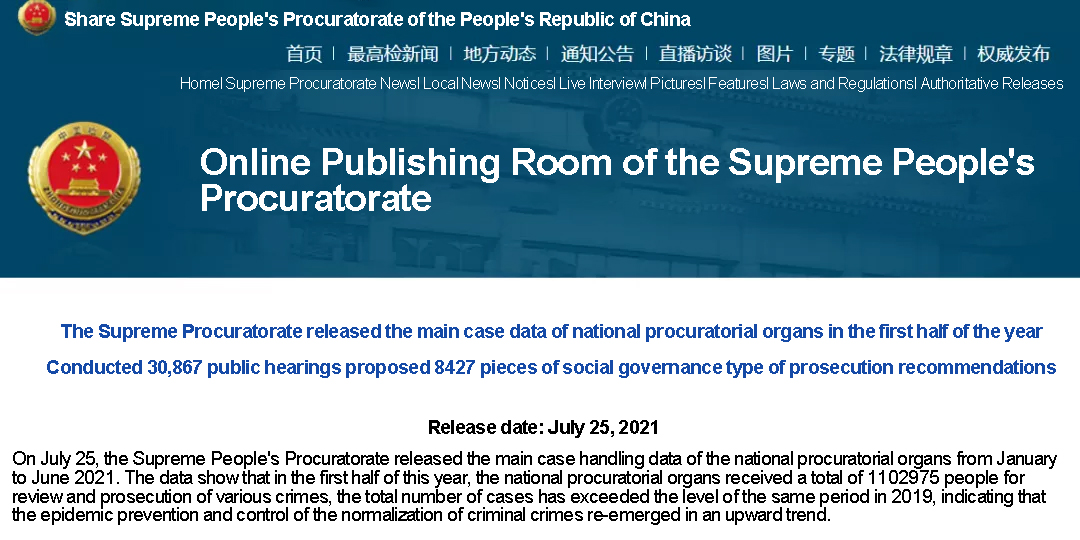
Since June 1 ane sa a, a number of laws and regulations on intellectual property, such as the Patent Law of the People’s Republic of China (newly revised), the Measures for Administrative Adjudication of Major Patent Infringement Disputes, the Management of Intellectual Property Protection on E-Commerce Platforms, and the Measures for the Management of Industrial Internet Marking, have also been implemented to protect the market order.
The newly amended Patent Law has raised the upper limit of statutory damages to 5 million yuan and the lower limit to 30,000 Yuan. Under the new punitive damages system, the people’s court may determine the number of damages within one to five times the amount calculated in accordance with the loss suffered by the right holder, the benefit gained by the infringer or the multiple of the patent license fee. The term of the design patent right is extended to fifteen years, and partial design patent protection is granted, elatriye. This also plays a role in strengthening the whole chain of intellectual property protection and creating a market-oriented, legalized and international business environment.
 iVIGA Tap Factory Supplier
iVIGA Tap Factory Supplier
